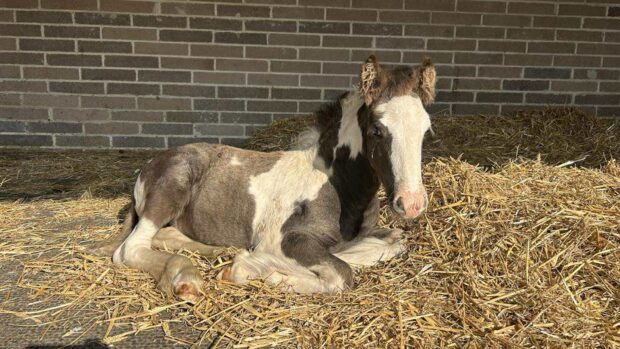The fruitless search for more information from authorities, following a case where 26 horses and ponies were intercepted before they were exported, has highlighted the very problem of how vulnerable horses can fall through the cracks.
H&H reported on the case, made public by World Horse Welfare, where an overloaded transporter containing “frightened and vulnerable” horses – some believed to be destined for slaughter in Europe – was stopped at Dover.
Of the 26 on board when the transporter was stopped on 25 November, only 19 had the necessary paperwork for their journey. Many of the horses had health issues, some were pregnant, at least one pony was infected with equine influenza and 13 had been signed out of the food chain.
In April, World Horse Welfare announced that the first of the expectant mares had delivered a foal at the charity’s Norfolk rescue and rehoming centre. World Horse Welfare is a charity, not a prosecuting body or public authority, so H&H sought to check with authorities as to whether there had been any arrests in the case.
Kent Police and Port of Dover Police each suggested H&H try the other. Kent Police also suggested contacting the Home Office/Border Force, which in turn told H&H to direct its query to Defra. HMRC said this was not a case that involved them and also suggested H&H try Defra.
When H&H approached Folkestone & Hythe District Council and Dover District Council – whose administrative areas include Eurotunnel and the port respectively – and asked if they had been involved in the case, both said they had no involvement. Dover District Council added that live animal exports are not an area of work over which it or Dover Port Health Authority have any jurisdiction.
World Horse Welfare has long been lobbying for robust enforcement of the law.
“No prosecutions have been raised as a result of the ‘Dover 26’ being abandoned after they were discovered, almost certainly being illegally smuggled out of the UK, and despite our urging no local authority has taken enforcement action,” World Horse Welfare chief executive Roly Owers told H&H.
“The only action that has been taken was by the APHA [Animal Plant and Health Agency] which revoked transporter authorisation for the vehicle the horses were discovered in.
“While we applaud this action, far more robust enforcement is needed to stop this murky trade where so many horses suffer. For this to happen, it is imperative the Government introduces legislation now for a fully digitalised and centralised traceability system for all equines, and import and export documentation.
“The stark reality is that we are only picking up the crumbs of a trade that covers the whole of Europe. And it’s a significant trade, with one trader alone moving nearly 1,000 equines a year.”
H&H approached Defra initially to ask if it was aware of any arrests, then to ask whether it or the APHA would like to comment on any action taken in relation to the case, and if Defra would comment on how the law will be enforced, following the new ban on live exports for slaughter, which came into effect last week (news, 23 May).
A Defra spokesperson told H&H the department does not comment on individual cases, but offered general background information.
The spokesperson quoted requirements and laws surrounding transportation of animals and added that the APHA takes potential breaches of animal welfare legislation very seriously and will take appropriate regulatory action. He also said that the local authority, which holds primary responsibility for the enforcement of the animal welfare in transport legislation, may also be notified and will consider any appropriate enforcement action.
In regard to live exports, the spokesperson said the Animal Welfare (Livestock Exports) Act 2024 will put a permanent end to the export of horses for slaughter and that Defra will be engaging with the horse sector and enforcement bodies on approaches to implementing the ban to ensure vulnerable horses are protected.
H&H understands that Defra wants to work with the sector to ensure that the ban is effective and prevents horses being exported for slaughter, without imposing burdens on legitimate transporters of horses.
A Kent County Council (KCC) spokesperson told H&H that Kent Trading Standards were notified when the horses were intercepted in Kent, and that ensuring animal welfare is an “important part of Trading Standards’ work across the country”.
“Our officers worked with APHA to investigate and determine responsibility and location of any offences, finally passing this to the appropriate local authority for them to consider taking further action.”
A KCC spokesperson added on Friday (31 May) that the appropriate local authority is Lancashire County Council.
H&H contacted Lancashire County Council for comment, who said that it is one of several local authorities are involved in this complex investigation, which has been passed to County Durham. A spokesperson Durham County Council told H&H on Monday (3 June) that the investigation has not come to them, and that they do not believe that there is any link to Durham at all.
* Story updated on 30 & 31 May, to include comments from Kent County Council; and on 3 June to include comments from Lancashire County Council and Durham County Council *
You might also be interested in:

Delight as live export for slaughter is banned – but loophole concerns

‘A monumental step’ towards banning live transport to slaughter

Subscribe to Horse & Hound magazine today – and enjoy unlimited website access all year round
Horse & Hound magazine, out every Thursday, is packed with all the latest news and reports, as well as interviews, specials, nostalgia, vet and training advice. Find how you can enjoy the magazine delivered to your door every week, plus options to upgrade your subscription to access our online service that brings you breaking news and reports as well as other benefits.




